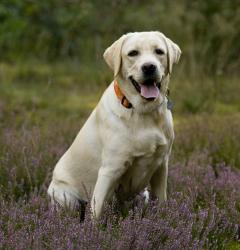Life changed for dogs during lockdown, study finds
Long-term study of Labrador health highlights impact of pandemic restrictions.

The lockdown experience of Britain’s favourite dog breed affected their lifestyles and veterinary care, research shows.
Labradors had similar levels of illness overall but went to the vet less often during the early months of the pandemic, according to a new study by the Royal (Dick) School of Veterinary Studies.
This highlights that dogs might not have received their usual veterinary care when they were ill. It is possible owners had difficulties accessing veterinary services or that they perceived their dogs' ailments as too minor to treat in the circumstances, say researchers.
The number of Labradors being vaccinated was down too as a result of there being fewer vet visits.
Experts say the findings should prompt owners to speak to their vet and make sure any gaps in their dog’s vaccination history are addressed.
Health benefits
However, not all impacts of lockdown were negative. Just as some people stepped up their fitness routines, Labradors enjoyed an increase in exercise and they were less likely to be given treats by their owners.
Labrador owners also reported less coughing by their dogs, which might have included infectious causes like kennel cough – a perennial ailment in dogs.
A reduction in dogs’ social interactions may have stemmed the spread of bugs, the team says.
Effects of pandemic
Researchers from the Royal (Dick) School of Veterinary Studies and the Roslin Institute gathered data from more than 4,000 Labrador owners in England between March and July 2020.
The team also found that, compared with previous years, Labradors were less likely to be insured, which may have been linked to the uncertain financial situation of many owners.
Dogs in the study sample were, however, more likely to be wormed – most probably because owners were spending more time with their pets and less likely to forget.
Researchers say the findings can inform owners and vets of the best practices for keeping dogs healthy during future pandemics.
Future studies should aim to help veterinary professionals and owners minimise the negative impacts of a pandemic on dogs, the research team says.
Health study
The research was carried out as part of the Dogslife project, which investigates the genetic and environmental factors that keep dogs healthy.
Dogslife has collected information from the owners of Kennel Club-registered Labradors since 2010.
The study is published in the journal BMC Veterinary Research and was supported by the Biotechnology and Biological Sciences Research Council.
Lockdown restrictions had a significant impact on Labrador retrievers. The implications of the changes are complex and further research should aim to shed light on how negative impacts of the Covid-19 pandemic and associated restrictions on dogs can be minimised.
Related links
About the Royal (Dick) School of Veterinary Studies
The Royal (Dick) School of Veterinary Studies is a one-of-a-kind centre of excellence in clinical activity, teaching and research. Our purpose-built campus, set against the backdrop of the beautiful Pentland Hills Regional Park, is home to more than eight hundred staff and almost fourteen hundred students, all of whom contribute to our exceptional community ethos.
The School comprises:
The Global Academy of Agriculture and Food Systems
The Hospital for Small Animals
The Jeanne Marchig International Centre for Animal Welfare Education
We represent the largest concentration of animal science-related expertise in Europe, impacting local, regional, national and international communities in terms of economic growth, the provision of clinical services and the advancement of scientific knowledge.


